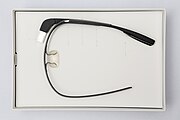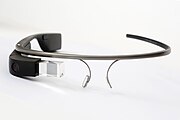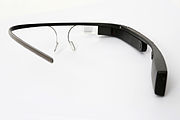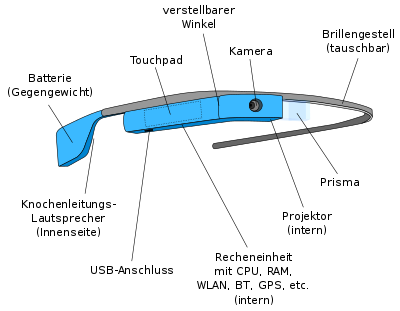Google Glass
| Google Glass | |
|---|---|
|
|
|
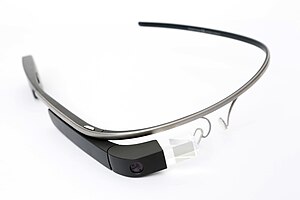
Google Glass Explorer Edition (2014) |
|
| Manufacturer | Google ( Foxconn ) |
| publication | June 28, 2012 (Presentation) Developer version: February 2013 Consumer: April 2014 (USA only as open beta version) |
| Technical specifications | |
| display | 640 × 360 px ( LCoS microdisplay, prism projector from Himax) |
| Main camera | Photo: 5 Mpx Video: 720p |
| Current operating system | Android 4.4.2 |
| processor | OMAP 4430 SoC , dual core |
| R.A.M. | 2 GB (682 MB for developers) |
| Internal memory | 16 GB Flash (12 GB usable) |
| Sensors |
Touchpad , microphone , camera , accelerometer , gyroscope , compass , brightness sensor , eye tracker , proximity sensor , position sensor |
| Connectivity | |
| Radio links | |
| connections | |
|
Battery life (according to manufacturer) |
Max. 2–3 hours hours (without an external battery, a working day cannot be managed with the glasses) |
| measures and weight | |
| Weight | 42 grams g |
| particularities | |
|
OHMD |
|
Google Glass is the brand name of a miniature computer worn on the head by the US company Google LLC . The product is assigned to the class of wearables ( wearable computing ). The distinguishing feature of this device is the optical display, which is mounted in the periphery of the field of vision on a glasses frame and is therefore also referred to as a Peripheral Head-Mounted Display (PHMD). Contrary to popular literature, strictly speaking, this is not a head-up display (HUD) if one follows its original definition from NASA , since (1) the perception of the information is independent of the head position and (2) information only can be augmented via the detour of camera playback. In the media-theoretical context, the technique for non-immersive belongs augmented reality ( English augmented reality ).
In addition to showing information on the display , information can also be combined with the image recorded by the internal digital camera . For this purpose, data can be obtained from the Internet and sent. While Google Glass represents a technical milestone for some IT experts, privacy advocates see it as a threat to the privacy of observed people. The glasses could discreetly spy out the wearer's surroundings and transfer records of all users to Google servers. In connection with the revelations about the surveillance program PRISM of the secret service NSA further concerns about glass arose.
development
Google Glass is a product that emerged from the Google Project Glass research project and was developed in the company's Google X division under Sergey Brin . It moved from Alphabet Holding to Google's AR / VR department in 2019.
The name Glass refers to the glass prism that displays the information in the user's field of vision. In the English-speaking world, Glass is sometimes incorrectly referred to as Glasses . Google boss Larry Page explains the Singular Glass as follows:
"It's only Glass because it's only on one side."
"It's only called Glass because it's only on one side."
The German term “data glasses” is also misleading. Although prototypes were screwed to a glasses frame, the device can also be attached to prescription glasses , sunglasses or sports glasses . This only covers a small part of the field of vision of one eye.
Google also applied for a patent for a contact lens camera - as an alternative to the previous design.
- Google Glass, Explorer Edition
Market launch
From mid-April 2014, several thousand Google Glass devices could be ordered as a test version in the USA, also in order to be able to assess social aspects for the wearer and the environment.
In January 2015, Google stopped selling for the time being. Glass Enterprise Edition 2, offered in 2019, is priced at around $ 1100. The battery life has been increased significantly and a USB-C port has been integrated for fast charging.
technology
Google Glass is a tiny portable computer (mass: 46 grams) with
- Display with 640 × 360 pixel resolution (also for moving images)
- 5 V and 1.5 A battery with 820mAh charge with USB Type-C, USB 2.0 480Mbps
- Qualcomm Quad Core, 1.7GHz and 3 GB memory ( RAM ) and 32 GB eMMC SSD storage
- microphone
- Sensors: GPS, GLONASS, light, 3-axis gyroscope , 3-axis acceleration sensor, blink sensor, barometer, head detection sensor, detection of whether the display is open
- Antennas for Bluetooth LE and HID as well as WLAN dual band 2.4 / 5 GHz 802.11a / b / g / n / ac
- 8 megapixel, 720p camera that lights up a red LED while recording
- Loudspeaker without bone conduction once intended
- Android Oreo operating system
The image is generated by an LCoS microdisplay and projected into the field of vision via a glass prism , which is the name given to Glass .
The Google Glass programming interface "Mirror-API" has so far been partially published. Glass uses a Representational State Transfer (REST) based interface. Texts, images or HTML excerpts (" snippets ") are transferred in a JSON document. The authentication is done with OAuth 2.0 .
Operation and functions
The device switches on with a slight upward movement of the head. A touch of the touchpad or the words "OK, glass" with a further command are used to select the function. In addition, context-dependent information is automatically displayed by Google Now .
Third-party providers such as Evernote with Skitch , Path and The New York Times want to add their own applications to the functionality of Glass. With the application (MyGlass) for smartphones with the Google Android operating system, it is also possible to digitally address and manage Glass devices.
Laser keyboard
Google was awarded a patent for a laser keyboard for Google Glass by the US Patent Office (USPTO). For this purpose, the glasses project a virtual keyboard onto the palm of the user via a laser. He can use it to take calls or write messages. The position of the typing finger and the entered character are recognized with the glasses camera.
Eye control
Glass wearers can take photos with a wink - even with the display switched off. The software can be used to set up and synchronize the data glasses with the smartphone.
face recognition
According to the company, facial recognition should be excluded. Glass is supposed to recognize people on the basis of their clothing with the help of a spatiogram - a file with characteristics such as patterns, structures and colors. The first facial recognition applications for Google Glass were announced in May 2013. The Facial Network company released a facial recognition app in early 2014 that will run on smartphones in addition to Google Glass. The program needs around 15 seconds to find the person filmed from among 2.5 million photos. Since Google does not yet allow facial recognition apps, the app will not be offered in the Google Play Store for the time being.
marketing
Google Glass was presented in a video in April 2012 and at the Google I / O developer conference on June 28, 2012. Prototypes for developers, the “Explorer Edition”, were offered from February 2013 at a price of 1500 US dollars. US developers were able to pre-order prototypes from Google I / O. As of 2019, the device has cost $ 999 in the US.
reception
Use
Constant access to the Internet or software, while your hands are free for other purposes, is advantageous in some industries, for example to display maintenance instructions in the field of vision. In this way, intralogistics could be revolutionized. Since order pickers have both hands free, faster order picking is possible. The internal computer is very light at 46 grams. Scott Huffman , vice president of Google, said they wanted to bring the keyboard-based communication of users to a more natural level than with an assistant.
Developers and designers saw Google Glass as a crucial step into a new age of computing that can trigger novel applications.
The American journalist David Pogue came to the conclusion after testing the device:
"[...] But if there's anything at all as different and bold (as iPhone or iPad) on the horizon, surely it's Google Glass."
"[...] If anything so different and daring (like iPhone or iPad ) is in sight, it is certainly Google Glass."
Glass can help police officers identify suspects on wanted lists using facial recognition. Furthermore, everyone can voluntarily register in a face recognition database in order to offer additional information about themselves.
The first book readable with Google Glass was published on October 8, 2014 by the European University Press . The book can be read as a normal paper book or - enriched with multimedia elements - with Google Glass, Kindle and smartphones and tablets of the iOS and Android platforms.
privacy
Because of the enormous importance of Google on the market, the project met with worldwide criticism even before it was ready for the market. Data protection activists oppose the introduction of the glasses because they could discreetly spy on the wearer's surroundings and transfer all records from all users to the company's own server.
Based on the concerns, the swear word "glasshole" was created for Google Glass users - derived from "asshole".
The combination of the technical possibilities of the device with the market power of the group raises concerns. In the opinion of some experts, the concealed recording of images and sounds in public spaces and their automatic transmission to the Group's server violates the right to informational self-determination . Each wearer of the data glasses also transmits their location via GPS, thus allowing movement profiles to be created .
After several disputes and the procrastination of information about the company's own data protection policy towards the EU, suspected false statements about data collection at Street View and the allegations of lying to state authorities in the USA, Google is no longer trustworthy in handling private data from several sides classified.
Thus, the journalist Andrew Keen compared the effects of Google Glass with those of the automobile launch and warned:
"Neither Orwell nor Hitchcock at their most terrifyingly dystopian could have dreamed up Google Glass."
"Neither Orwell nor Hitchcock could have imagined Google Glass in their most terrifying dystopias ."
It is feared that data collected by Google about users and those who recorded them while wearing glasses could be evaluated with facial or speech recognition software over an indefinite period of time.
Google tried to weaken data protection concerns in the API regulations for external software developers presented on April 16, 2013, and forbids these developers from placing advertisements and passing on collected data to third parties, unless permitted by Google.
Fears about an evaluation with facial and speech recognition software were heightened when the surveillance program PRISM of the NSA became known in the summer of 2013 . Google's cooperation with the service suggested that the NSA was gaining access to the data recorded by Glass from people who are not nationals of the United States and evaluating them accordingly. Matthew Yglesias wrote in Slate magazine about the possible negative effects of intelligence activities on the export of high-tech products:
“But Google Glass + NSA PRISM essentially amounts to a vision in which a foreign country is suddenly going to be flooded with American spy cameras. It seems easy to imagine any number of foreign governments having a problem with that idea. "
“But Google Glass + NSA PRISM (now) basically leads to a vision in which a foreign country is suddenly flooded by American spy cameras. It seems easy to imagine that any foreign government would have a problem with this idea. "
Prohibitions
In Ukraine and the Russian Federation , the sale and use of Google Glass are believed to be banned as the devices are recorded as spy technology.
A bill that would prohibit the wearing of smart glasses while driving a vehicle was introduced in the USA by member of parliament Gary Howell from West Virginia .
The UK Department of Transport is considering banning the use of Google Glass while driving in the UK .
The private initiative "Stop The Cyborgs" is committed to the resistance against glasses and has already convinced traders in the USA to ban glasses on their premises. As one of the first casinos , the Caesars Palace in Las Vegas banned the wearing of glasses, as computers and recording devices are not allowed to be used in casinos in the US state of Nevada .
Comparable developments
- Head-mounted displays
- Vuzix , Golden-i , Laster Technologies , Recon Instruments, and Si14 make devices with similar functionality.
- The Oculus Rift is unlike Glass for virtual reality designed.
- EyeTap , prototype
- Microsoft Hololens
- Contact lens displays
- Researchers such as Professor Babak Parviz from the University of Washington are working on contact lenses that could use a built-in display to show information directly in front of the eye.
literature
- Eric Butow, Robert Stepisnik: Google Glass For Dummies. John Wiley & Sons Inc, 2014, ISBN 978-1-118-82522-8
Web links
- Glass - Technical Specifications
- Video: Official 2013 promo video , February 20, 2013
- Secured patents
- The dark side of Google Glass
- The Google Mirror API. Google Developers, accessed April 16, 2013 .
Individual evidence
- ↑ Matthies, DJC, Haescher, M., Alm, R., Urban, B. Properties Of A Peripheral Head-Mounted Display (PHMD). In Proceedings of 17th International Conference on Human-Computer Interaction . 2015.
- ↑ Prinzel, L., & Risser, M. Head-up displays and attention capture. In NASA Technical Memorandum, 213000. 2004.
- ↑ Milgram, P., Takemura, H., Utsumi, A., & Kishino, F. Augmented reality: A class of displays on the reality-virtuality continuum. In Proceedings of Photonics for Industrial Applications (pp. 282-292). International Society for Optics and Photonics. 1995.
- ↑ vk, sk: Google Glasses: Are smart data glasses coming in 2012? In: Computer Bild . April 5, 2012.
- ↑ a b c d Andrew Keen: Why life through Google Glass should be for our eyes only. CNN , February 26, 2013, accessed March 27, 2013 .
- ↑ "Google Glass": What does Google do with user data? dated June 10, 2013, viewed on March 25, 2017
- ↑ Achim Sawall: Google Glass is said to cost under $ 1,500 from February 23, 2013 on golem.de, viewed on March 27, 2013
- ↑ a b c d e Lorenz Mazat: Google Glass and data protection: The surveillance cameras running around , netzpolitik.org, from March 10, 2013, viewed on March 27, 2013
- ↑ Google Zeitgeist Conference 2012 , May 2012
- ↑ Contact lens camera - New patent from Google on cameranews.de, April 26, 2014
- ↑ heise online: Google Glass won't be coming "about a year from now" , April 23, 2013, accessed on April 26, 2013
- ↑ Launch of Google Glass: Don't be scared! In: Süddeutsche.de . April 15, 2014, accessed June 14, 2014 .
- ↑ Jay Kothari: Glass Enterprise Edition 2: faster and more helpful. In: Google Glass. May 20, 2019, accessed May 21, 2019 .
- ↑ Stephen Hall: Google Glass Enterprise Edition 2. [1] , May 20, 2019, accessed on May 20, 2019 (English).
- ↑ Mark Gomes: Google Glass Coming Early - Shares Of Himax Are Poised To Triple. Seeking Alpha, April 4, 2013, accessed March 25, 2017 .
- ^ The Google Mirror API. Google Developers, accessed April 16, 2013 .
- ↑ Gerwin Sturm: Mirror API, Cloud Endpoints & Google+ Sign-In. March 12, 2013, accessed March 13, 2013 .
- ^ Timothy Jordan: Building New Experiences with Glass. In: YouTube . Google Developers, April 4, 2013, accessed April 11, 2013 .
- ↑ Alexis Santos: Apps for Google Glass. Engadget , March 11, 2013, accessed on March 25, 2017 .
- ^ MyGlass. In: Google Play Store. Retrieved April 16, 2013 .
- ↑ Google Glass Code Would Let Users Snap Photos by Winking
- ↑ Jan-Keno Janssen: Google-Glass-Update: Unnoticed snapping with a wink Heise online from December 18, 2013, viewed on March 25, 2017
- ^ Daniel Cooper: Google Glass learns how your friends dress, picks' em out in a crowd. Engadget , March 8, 2013, accessed on March 25, 2017 .
- ↑ Ricardo Bilton: New Google Glass hack gives doctors the power of face recognition venturebeat.com, from May 13, 2013, viewed on March 25, 2017
- ↑ Stefan Schulz: Don't be a stranger! FAZ from January 13, 2014, viewed on March 25, 2017
- ↑ Christian Stöcker: Google Show An overview of the most important announcements In: Spiegel Online . June 28, 2012.
- ↑ Sharon Gaudin: Google Glass launches new age of personal computing, July 5, 2012, viewed March 25, 2017
- ↑ Jeff Clark: Google Glass: A Future Cool Tool for the Data Center? ( Memento from March 26, 2017 in the Internet Archive ) from June 28, 2012, viewed on March 25, 2017
- ↑ Josh Wolonick: Will consumers accept Google Glass? on USA Today , February 27, 2013, viewed March 31, 2013
- ↑ Sharon Gaudin: Google Glass launches new age of personal computing on computerworld.com from July 5, 2012, viewed on March 25, 2017
- ^ David Pogue: Google Glass and the Future of Technology, The New York Times, September 13, 2012, viewed March 25, 2017
- ↑ David Talbot: "Google Glass: Researchers demand facial recognition" Heise from July 2, 2013, viewed on September 9, 2013
- ↑ The world's first book that can be read with GoogleGlass. October 9, 2014, accessed on October 12, 2014 (English, German, pdf).
- ↑ Don't be a “glass hole” Frankfurter Rundschau
- ↑ Glass Hole Urban Dictionary
- ↑ Google Glass etiquette wearvision.de
- ↑ Claire Davenport: EU privacy regulators take aim at Google privacy policy Reuters of February 18, 2013, viewed on March 25, 2017
- ↑ Achim Sawall: Deutsche Telekom criticizes Google Glass on golem.de from March 15, 2013, viewed on March 25, 2017
- ↑ Michael Hiltzik: Google may not be evil, but it's also not trustworthy , Los Angeles Times of May 12, 2012, viewed on March 27, 2013
- ↑ Google Emulates Apple in Restricting Apps for Glass New York Times of April 16, 2013. The API guidelines: Glass Policies
- ^ Matthew Yglesias: Is PRISM Going To Harm US High-Tech Exports? dated June 7, 2013, viewed July 21, 2013
- ↑ Украинцы не смогут легально купить очки Google Glass из-за запрета на "шпионские" гаджеты from March 13, 2013, viewed on March 27, 2013
- ↑ a b Ria Novosti: Google Glass Sees Preemptive Pushback in US from March 26, 2013, viewed on March 25, 2017
- ↑ David Millward: Drivers to be banned from wearing Google Glass Telegraph, July 31, 2013, viewed March 25, 2017
- ↑ Homepage stopthecyborgs.org (offline)
- ↑ Elke Schick: Casino bans Google Glass. heise online, May 9, 2013, accessed on March 25, 2017 .
- ↑ Nick Bilton : Google Begins Testing Its Augmented-Reality Glasses In: New York Times . April 4, 2012.
- ^ Matthias Jaap: Google's Project Glass In: Mac Life . April 5, 2012.
- ↑ Andreas Donath: Google's computer glasses become reality In: Golem.de . April 4, 2012.

